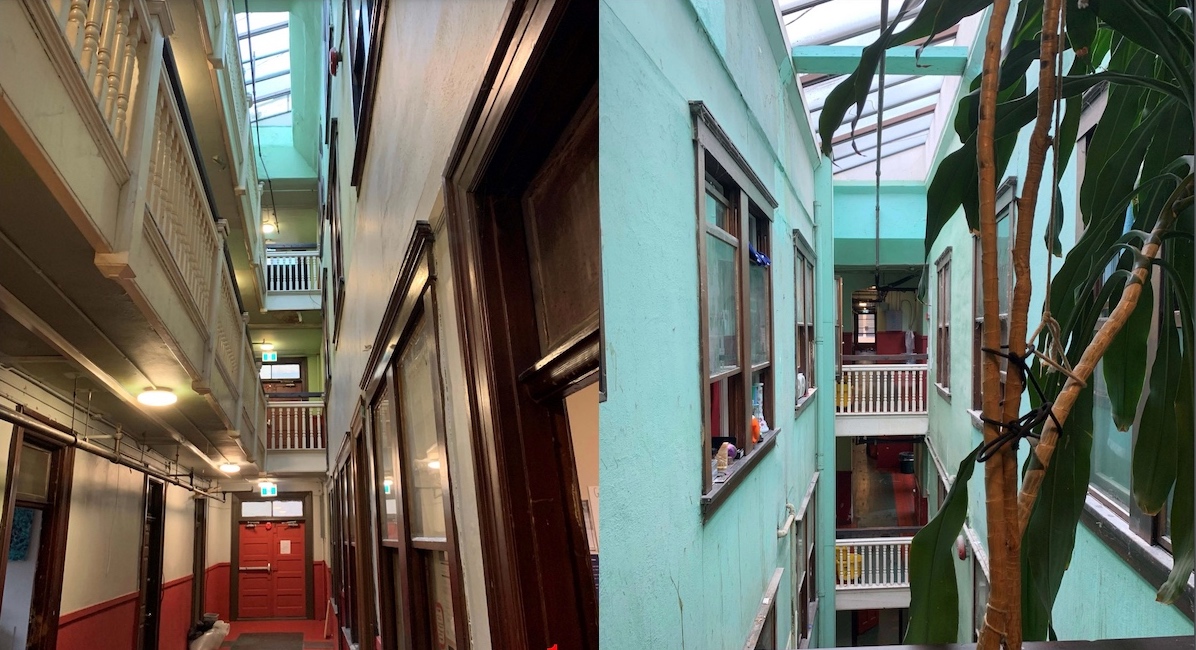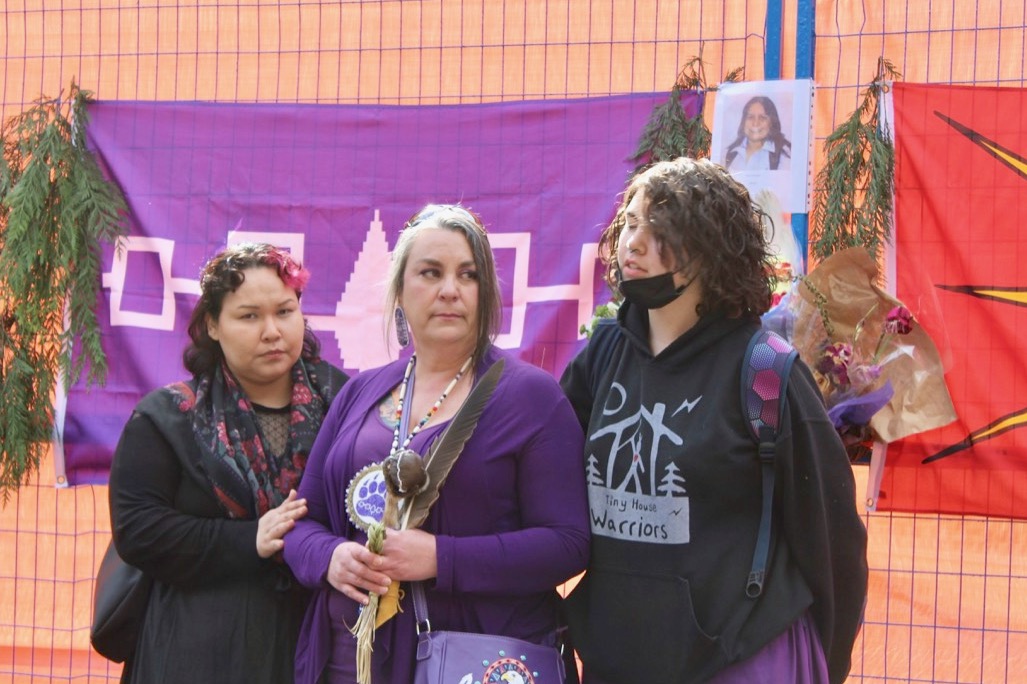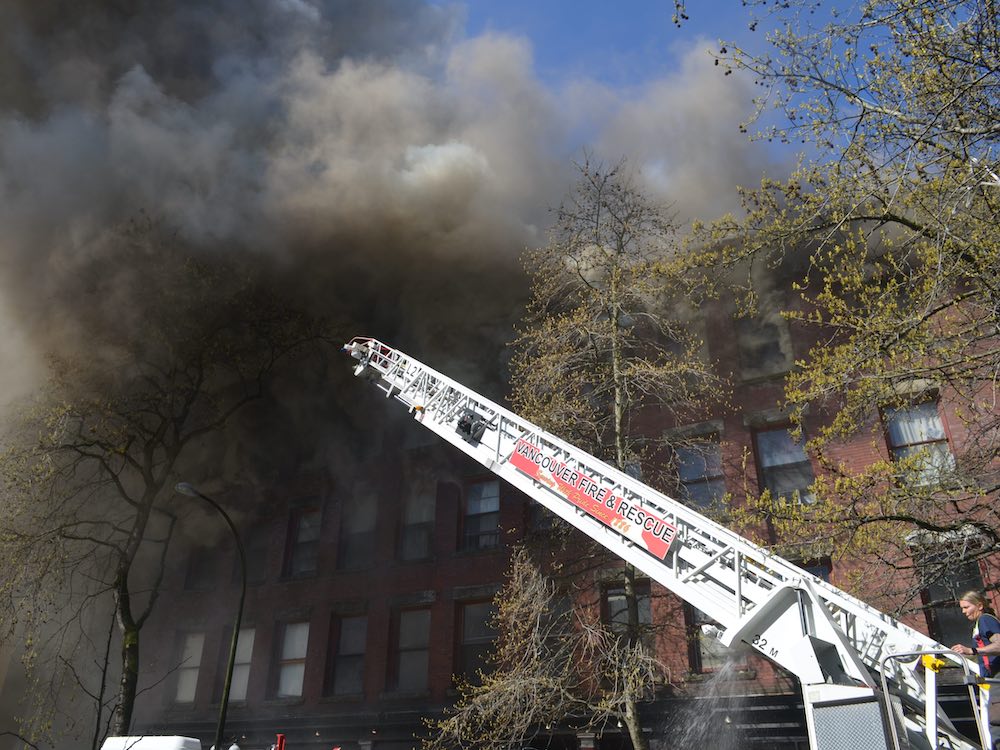[Editor’s note: This story includes images of a fatal fire that may be upsetting for some readers.]
A jury made 25 recommendations this week to improve fire safety, overall safety and the quality of housing for low-income tenants following a two-week coroner’s inquest.
The inquest examined the factors that led to the deaths of Mary Ann Garlow and Dennis Guay on April 11, 2022, when a fire tore through the Winters Hotel, a single-room occupancy hotel in Vancouver’s Gastown neighbourhood.
The inquest heard that the 115-year-old building faced greater fire risk because of its unusual design; an open interior space that extended for three floors and an unused elevator shaft provided space for the fire to grow and spread.
The five-person jury heard that the building’s alarm and sprinkler system were 50 years old and that the alarm wouldn’t meet modern building codes. The building also lacked modern building material that would have slowed the spread of the fire from room to room.
Despite those vulnerabilities, the Winters housed a mix of high-needs tenants: younger residents in active addiction, seniors and people living with disabilities and mental illness. Fires were common: on April 8, 2022 — a Friday — the fire department had responded to a smaller fire in a room on the third floor, which had been quickly put out when the sprinkler system deployed and tenants used several fire extinguishers.
Days later, the deadly fire started when a tenant left candles burning in their bed — something they’d done repeatedly and a habit staff were aware of, according to the fire investigation report.
Garlow was a 68-year-old residential school survivor who had lived in the Downtown Eastside for decades and was devoted to caring for her son, John. Guay had worked for 20 years in local government in northern B.C. but ended up at the Winters after a mental health crisis. Although Guay had been hard of hearing since childhood, he loved to play guitar and write songs.
Tenants and staff with Atira Property Management, the building operator, testified that they had received little or no fire safety training. Despite Guay being deaf and needing hearing aids, there was no plan in place to alert him in case of fire and he had never been equipped with an adaptive alarm, like a strobe light or vibrating bed.
Although the building was ordered to be on fire watch after the April 8 fire until the sprinklers could be turned back on, none of the Winters staff who testified said they were familiar with Vancouver Fire Rescue Services’ fire watch requirements.
Inquest testimony also revealed that the building’s fire safety plan could not be found in Atira’s files, at the City of Vancouver or with Royal City Fire Supplies, a fire services company contracted by Atira. That plan is required by law to be created and a copy filed with the municipality where a building is located.
The manager of the Winters, Gina Vanemberg, told the inquest she had never held a fire drill in the building from the time she started the job in March 2020, and that new tenants were not told where they were supposed to gather outside in case the building had to be vacated.

Vanemberg testified there was an understanding among Atira employees that they should avoid calling after-hours contractors because of the higher fees charged, and said she waited until Monday, April 11, to call the fire service company to come and reset the sprinklers, check the alarm and replace spent fire extinguishers. When the fire started just before 11 a.m. on April 11, tenants searched frantically for working fire extinguishers before resorting to throwing water from a mop bucket on the fire.
Tenants and Atira staff testified that in the months before the April 11 fire, they had seen chains across the fire escape doors. While photos and video showed those chains were not present on the day of the fire, tenant Jennifer Hansma said she assumed she wouldn’t be able to open the fire escape doors as she escaped the building.
The problems continued after the fire: there was confusion about whether Garlow and Guay had been accounted for, and Guay wasn’t reported missing to police until 15 days after the fire. Even then, it was Union Gospel Mission, not Atira, that reported him missing. The inquest heard that there were three different tenant lists for the Winters, and that police officers had to cross-reference names from one of those lists with welfare payments — a process that found five more people living at the Winters who weren’t on tenant lists.

The jury also heard that BC Housing’s involvement with the building was unusual. In June 2017, the Balmoral Hotel at 159 E. Hastings St. had been condemned by the city, meaning housing had to be quickly found for dozens of residents. Janice Abbott, the CEO of Atira at the time, had signed a lease with Peter Plett, the owner of the Winters Hotel. Atira then went to BC Housing with the lease agreement to ask for funding to operate the building for low-income tenants, many of whom came from the Balmoral and some of whom were later placed there from BC Housing’s wait-list.
Because of this unusual arrangement, BC Housing never inspected the building before signing an operating agreement with Atira for the Winters and providing $1.5 million in funding for the operation of the building. BC Housing never completed an operational review of the Winters, first because Atira asked for the review to be delayed, then because of the COVID-19 pandemic, according to testimony from BC Housing staffer Heidi Hartman.

A 2023 investigation commissioned by the B.C. government previously criticized Atira’s “propensity to bypass standard BC Housing channels” when requesting funding or purchasing properties with BC Housing funds. That investigation found that Abbott’s husband, Shayne Ramsay, who was CEO of BC Housing from 2000 to 2022, improperly directed funding and projects to Atira, leading to a situation where his wife’s organization was receiving a much higher level of government funding than other supportive-housing providers.
Abbott resigned from Atira shortly after the findings of the investigation were made public on May 8, 2023.
The jury’s recommendations
Coroner’s inquests don’t find fault but seek to determine how a person died. A jury of five people hears evidence and then recommends changes that could help prevent similar deaths.
During his testimony, Grant Barton, a senior Atira employee, repeatedly asked for Garlow's and Guay’s deaths to be treated not as a fire safety issue but as part of the “systemic issues” of the impoverished Vancouver neighbourhood where they lived.
“If I were to speak to the jury, I would ask them to look at... the Downtown Eastside and how the death of Mary and Dennis needs to not be about fire safety,” said Barton, whose job title was managing director of supportive housing at the time of the fire.
“It needs to be about this system that’s in place that is failing.”
Misty Fredericks, Garlow’s niece, had started advocating for a coroner’s inquest shortly after the fire and attended every day of the inquest in person, sometimes wearing a special ribbon skirt she’d made emblazoned with Garlow's and Guay’s names.
Fredericks said she didn’t agree with Barton’s interpretation of the cause of the tragedy.
“Across the board, when Atira’s staff and tenants were asked, ‘Did you have fire safety training?’ the answer was no,” she told The Tyee.

Presenting their list of recommendations, the jury called for BC Housing to write lease agreements in a way that holds building operators to a higher standard for fire safety. The jury recommended that tamper-proof smoke detectors and door closers be installed, that an inventory of backup fire extinguishers be kept at a separate location and that staff and tenants be provided comprehensive fire safety training.
The jury also recommended that fire safety plans include personalized evacuation plans for tenants with disabilities, and that those plans be written in consultation with those tenants.
The jury also made wider-ranging recommendations that focused on single-room occupancy hotels and B.C.’s dire need for safer housing options for low-income people. SROs are century-old buildings common throughout downtown Vancouver that feature tiny rooms and shared bathrooms.
The jury recommended that BC Housing phase out funding to privately owned SROs and avoid housing people with complex needs in SROs.
After hearing testimony that the fire watch was not being done properly in the Winters when the sprinkler system was off, the jury recommended that BC Housing require housing operators to use separate staff or contractors to do fire watch patrols.
The jury recommended that SRO operators should also have a resource team available 24-7 to provide help to building staff during critical incidents like fires. SRO operators should also be required to maintain up-to-date tenant lists, the jury said.
And the jury recommended legislation to fully fund assistive devices for people with disabilities, such as flashing lights to supplement audible alarms for deaf people. The jury suggested that if a new law is passed, it could be named in honour of Guay.
Perhaps most significantly, the jury recommended that an arm’s-length tenant ombudsperson position be created to receive and investigate tenant concerns. Currently, tenants can only complain to BC Housing, and many tenants say they have little faith that BC Housing is taking their complaints seriously.
All the recommendations are posted on the BC Coroners Service website.
In a statement, Atira said it accepts all of the recommendations and promised the organization has improved training for staff since the fire. The organization also said the only long-term solution to truly improve safety for SRO tenants would be to provide newer, purpose-built housing for the residents.
Fredericks said some of the witnesses who testified repeated stereotypes about people who live in the Downtown Eastside, characterizing residents as chaotic, impaired or in mental health crises, with some witnesses saying it would be impossible to do fire drills with such a population.
But Fredericks said that was “not OK,” and those stereotypes don’t fit Garlow or Guay.
“There are more people living down there — seniors, students,” Fredericks said.
“I’m just hoping there will be changes at the provincial and the municipal level.”
Guay’s sister and parents also attended the inquest, testifying that Guay’s death had “left a massive void” in their lives. Asked if the family would like to comment on the inquest conclusion, Guay’s sister, Kirsten Conforti, sent a simple message: “We thought the jury did the best they could, and we were pleased with the recommendations.” ![]()
Read more: Rights + Justice, Housing

















Tyee Commenting Guidelines
Comments that violate guidelines risk being deleted, and violations may result in a temporary or permanent user ban. Maintain the spirit of good conversation to stay in the discussion and be patient with moderators. Comments are reviewed regularly but not in real time.
Do:
Do not: